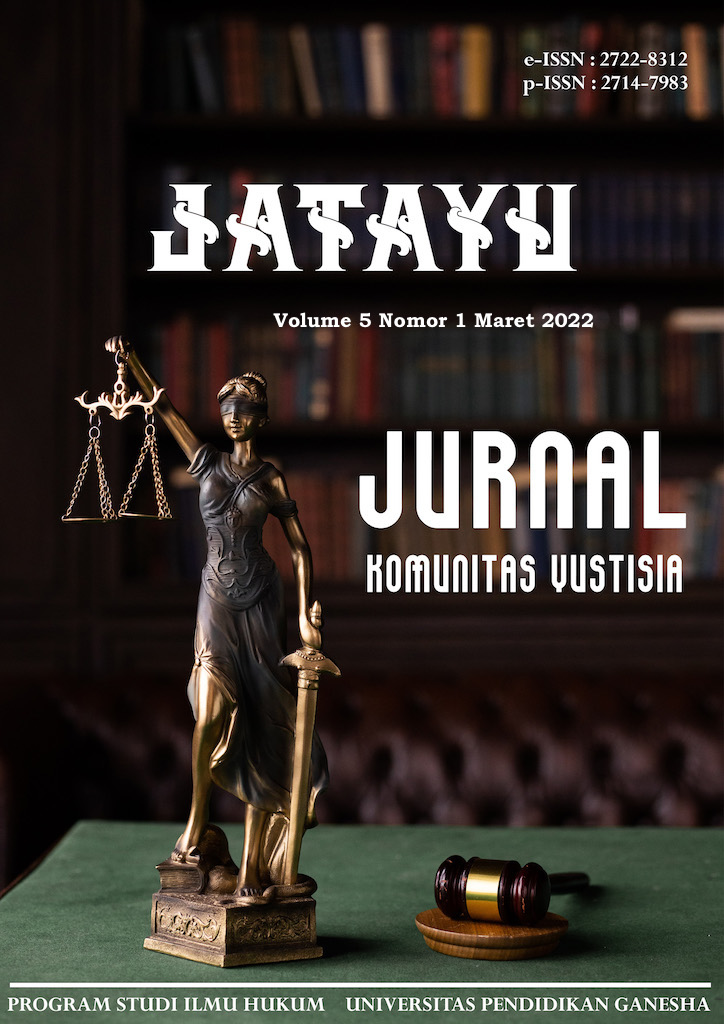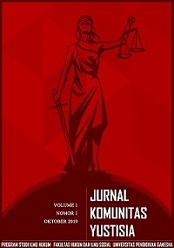TANGGUNG JAWAB INDONESIA SEBAGAI NEGARA PENERIMA ATAS TINDAKAN PERUSAKAN GEDUNG KEDUTAAN MALAYSIA
DOI:
https://doi.org/10.23887/jatayu.v5i1.45926Keywords:
Negara, Konvensi Wina 1961, Hubungan Diplomatik.Abstract
Penelitian ini dilakukan dengan tujuan (1) untuk mengetahui pengaturan hukum dalam Konvensi Wina 1961 di dalam membentuk perlindungan hukum kepada Negara pengirim, serta (2) untuk mengetahui tanggung jawab Indonesia terhadap kerusakan Gedung Kedutaan Besar Malaysia yang diakibatkan para demonstran. Dalam penelitian ini menggunakan penelitian hukum normatif, dengan melakukan pendekatan konseptual (conceptual approach) dan pendekatan kasus (case approach). Bahan hukum yang digunakan adalah bahan hukum primer, sekunder dan juga tersier sebagai dasar analisis. Berdasarkan hasil penelitian yang diperoleh menunjukan bahwa (1) pengerusakan gedung Kedutaan Malaysia sudah melanggar peraturan di dalam Konvensi Wina 1961, (2) pengerusakan terjadi akibat dari kelalaian negara penerima karena kurangnya keamanan di daerah Gedung Perwakilan sehingga menimbulkan pelanggaran dan mewajibkan negara penerima bertanggung jawab atas hal tersebut. Pengaturan mengenai pelanggaran hak kekebalan diplomatik yang dimiliki para pejabat diplomat diatur di dalam Konvensi Wina 1961 pasal 29 dan pasal 37 ayat 1 dan mengenai gedung perwakilan diatur di dalam pasal 22 dan 30. Agen diplomatik diwajibkan mendapat perlindungan dari negara penerima agar merasakan keamanan di dalam menjalankan tugas dan misinya sehingga tidak ada perbuatan yang mengganggu ketentraman perwakilan asing.
Downloads
Published
Versions
- 2022-10-23 (2)
- 2022-03-30 (1)
Issue
Section
License
Copyright (c) 2022 Jurnal Komunitas Yustisia

This work is licensed under a Creative Commons Attribution-ShareAlike 4.0 International License.
Authors who publish with this journal agree to the following terms: Authors retain copyright and grant the journal right of first publication with the work simultaneously licensed under a Creative Commons Attribution License that allows others to share the work with an acknowledgement of the work's authorship and initial publication in this journal. Authors are able to enter into separate, additional contractual arrangements for the non-exclusive distribution of the journal's published version of the work (e.g., post it to an institutional repository or publish it in a book), with an acknowledgement of its initial publication in this journal. Authors are permitted and encouraged to post their work online (e.g., in institutional repositories or on their website) prior to and during the submission process, as it can lead to productive exchanges, as well as earlier and greater citation of published work (See The Effect of Open Access). Authors who publish with this journal agree to the following terms: Authors retain copyright and grant the journal right of first publication, with the work [SPECIFY PERIOD OF TIME] after publication simultaneously licensed under aCreative Commons Attribution License that allows others to share the work with an acknowledgement of the work's authorship and initial publication in this journal. Authors are able to enter into separate, additional contractual arrangements for the non-exclusive distribution of the journal's published version of the work (e.g., post it to an institutional repository or publish it in a book), with an acknowledgement of its initial publication in this journal. Authors are permitted and encouraged to post their work online (e.g., in institutional repositories or on their website) prior to and during the submission process, as it can lead to productive exchanges, as well as earlier and greater citation of published work (See The Effect of Open Access).






